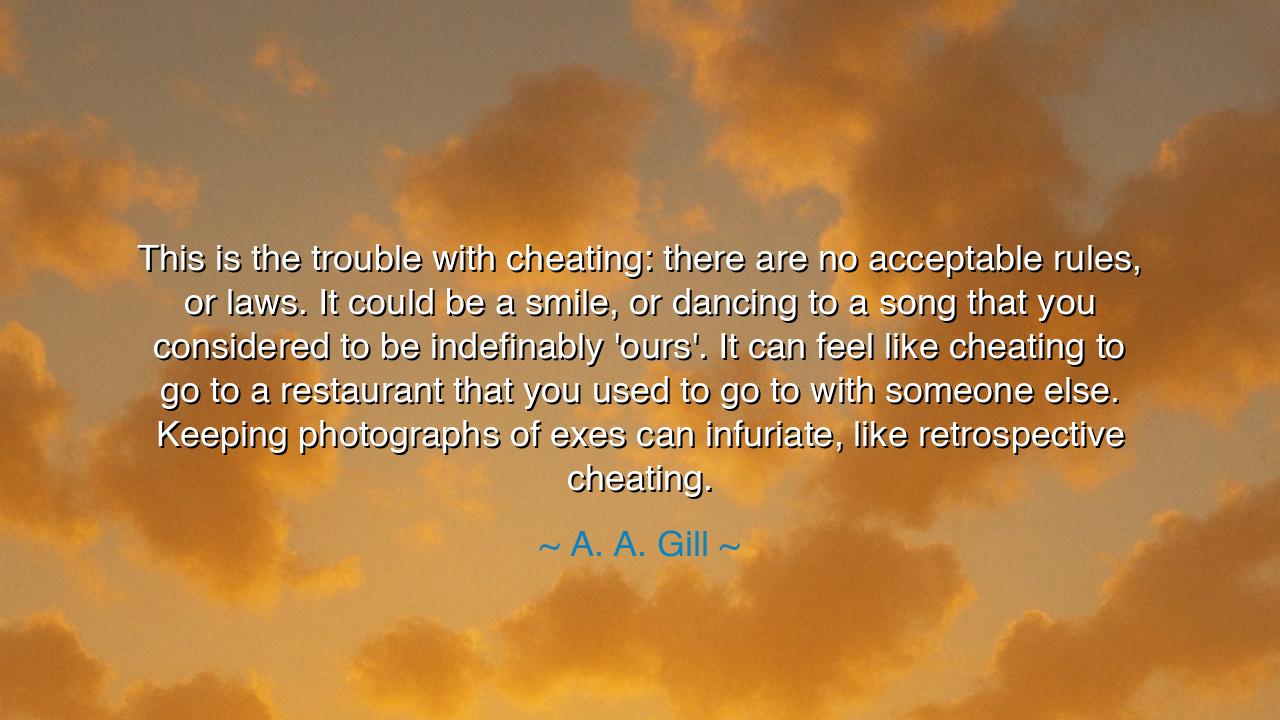
This is the trouble with cheating: there are no acceptable rules
This is the trouble with cheating: there are no acceptable rules, or laws. It could be a smile, or dancing to a song that you considered to be indefinably 'ours'. It can feel like cheating to go to a restaurant that you used to go to with someone else. Keeping photographs of exes can infuriate, like retrospective cheating.






Hear the words of A. A. Gill, sharp observer of human frailty, who declared: “This is the trouble with cheating: there are no acceptable rules, or laws. It could be a smile, or dancing to a song that you considered to be indefinably ‘ours’. It can feel like cheating to go to a restaurant that you used to go to with someone else. Keeping photographs of exes can infuriate, like retrospective cheating.” In this passage, Gill unveils not only the raw wound of betrayal, but also the elusive, shifting boundaries of intimacy. For what wounds deepest in love is not always the act itself, but the meaning hidden within it.
The origin of his words lies in the nature of human bonds. Love, unlike commerce or law, has no codified statutes. Nations write constitutions, courts interpret rules, merchants draft contracts, but between two lovers, the only binding law is trust. When that trust is cracked, even a smile—once innocent—may carry the weight of betrayal. Gill reminds us that cheating is not confined to the body; it is a breach of the heart’s covenant, and it takes its form in gestures, memories, and unspoken intimacies.
The ancients knew this well. Consider the tragedy of Othello, who in Shakespeare’s telling was undone not by physical betrayal, but by the mere suggestion of divided affection. A handkerchief, a whisper, a glance—these were enough to unravel his soul. The story reflects Gill’s insight: that love is so fiercely sacred that even the smallest signs of divided loyalty can scorch it like fire. For the bond of two hearts is built not only on acts, but on symbols, places, and shared moments that become holy ground.
History gives us another echo in the life of Henry VIII and Anne Boleyn. The king, consumed with suspicion, found cheating not only in Anne’s actions, but in her very associations, her letters, her friendships. To him, even the faint shadow of divided attention was treason. And though his wrath was cruel and unjust, it reveals the same truth Gill proclaims: in love, the boundaries of betrayal are not fixed by law but drawn by the delicate lines of expectation, memory, and devotion.
Gill’s words are not only about jealousy—they are about the fragility of human trust. What feels like cheating to one may seem harmless to another. A photograph tucked away may be nothing to its keeper, yet to the partner, it burns with the sting of being second best. Thus, the lesson is that love requires not rules, but communication, not rigid laws, but tender awareness of another’s heart. For without this, the lovers drift into the land of misunderstanding, where every smile or memory can be mistaken for treachery.
The teaching is heavy yet profound: true fidelity is not only of body, but of soul. To honor another is to guard not just your actions, but your symbols, your memories, your gestures. It is to say, “What was once sacred with another shall no longer trespass upon what is sacred with you.” For in this way, the new bond is honored, and the old is laid to rest.
Therefore, beloved, let this be your practice: speak openly with those you love. Do not assume that the boundaries of cheating are self-evident, for they shift like sand between hearts. Ask, listen, and honor. Guard not only against betrayal, but against the careless wound of divided memory. Choose always the smile that strengthens your present bond, not the one that stirs old ghosts. In this way, your love will be shielded from the silent poisons that Gill so clearly names, and you will build not a fragile truce, but a fortress of trust.






AAdministratorAdministrator
Welcome, honored guests. Please leave a comment, we will respond soon